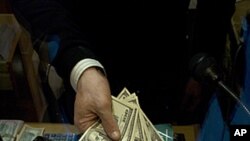The euro has lost 5.1 percent versus the dollar over the past month. And a spate of poor eurozone economic data Friday further eroded its value, signaling a grim economic outlook for the European economy in 2012.
At 13 years old, the euro is barely a teenager. But, so far, it has had an eventful life.
At its inception, Germany, the currency zone’s biggest economy, was still digesting the huge costs of incorporating East Germany, and there were wider concerns about whether such an ambitious project of a common currency would even work.
Despite concerns, it soon matched the dollar one for one. Then shot past it. Even after the financial crisis in 2007 - and a recession soon after - it held its value.
But now a second eurozone recession is back and the markets have turned against it. Friday it hit a 16-month low against the dollar.
Jeremy Stretch a London-based currency strategist for the Canadian Bank CIBC, explains the weaknesses analysts identified several years ago are finally surfacing.
"I think those flaws were essentially being masked by the process of broader economic growth and it’s now only when we see a downturn that we haven’t seen in the majority of peoples' lifetimes that’s really underlined the sort of structural failings within the Eurozone project. It was a process designed by politicians and that’s part of the inherent flaw. The politicians didn’t design the process in the optimal way," he said.
The story may not just be euro weakness, but dollar strength. U.S. economic statistics were depressed until fall 2011 - with high unemployment, huge and growing government debt, and a housing market still yet to recover.
But now there are signs of improvement.
On Friday the U.S. reported that it created 200,000 jobs in December, the sixth month in a row of gains. The unemployment rate is now 8.5 percent. It was 10.1 percent just over two years ago. Unlike the eurozone, the U.S. isn’t predicted to fall back into recession in 2012.
"Going back to the start of the crisis, the U.S. was the first economy to really suffer the depths of the downturn and I think the U.S. were relatively early in terms of some of the procedural measures they put in place to try to alleviate that - in terms of cutting interest rates to effectively zero and putting in fairly sizeable injections of capital into the banking system and into the economy at large," Stretch stated. "So in essence there is an element of first in, first out.”
And looking ahead into 2012, the downsides all look to be on the eurozone. Greece may default. France could lose its AAA credit rating. Some of its biggest banks could need government bail outs. Where the euro enters its 14th year in 2013, who knows what it’ll be worth.




